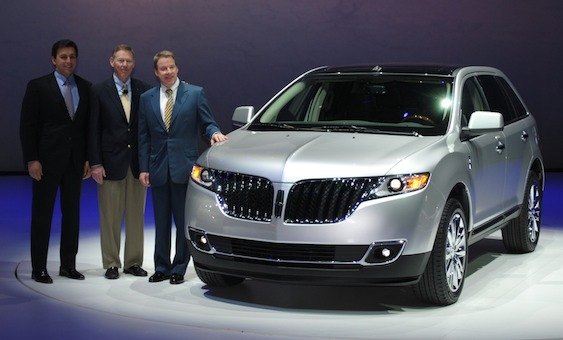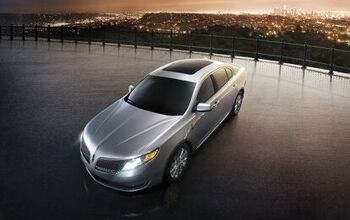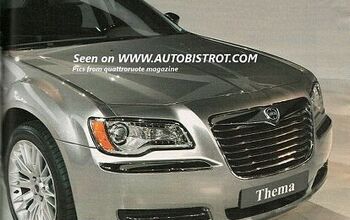Lord Love A Lincoln
With news that Mercury will receive new product based on the forthcoming Ford Focus, the bandwagon to crown Ford as the new King of Detroit has halted briefly as its passengers take a moment to remember: oh yeah, Ford is technically still trying to compete in the luxury game. Ford’s recent luxury-brand efforts have been so half-hearted in comparison with its Ford-brand turnaround that many analysts simply overlook Lincoln and Mercury when proclaiming Dearborn’s momentum. As, apparently, have consumers. Neither Lincoln nor Mercury cracked 100k sales units in 2009, a feat achieved even by such marginal luxury brands as Buick, Cadillac, and Acura. And as the Detroit News details, the problems with Lincoln-Mercury run deep, and their solutions are far from obvious.
The DetN’s Bryce G Hoffman tears the lid off of Ford’s five-year old plan to return Lincoln to some kind of marketplace relevance, a plan that would have seen Lincoln replacing Mercury all together as the sole purveyor of Ford luxury. As Hoffman describes it,
It has been nearly five years since former Ford design chief Peter Horbury, fresh from an extreme makeover of Ford’s Volvo brand, stood before Bill Ford Jr. and asked to do the same with Lincoln.
A screen behind Horbury displayed the next generation of every Lincoln product — an unimpressive lineup of cars and trucks that bore an obvious resemblance to the Ford products on which they were based. A different grille and few different bends in the sheet metal was all that differentiated them.
What vehicles were they bemoaning as poorly-differentiated rebadges? The Fusion-based Zephyr, for one.
Pretty rebadge-tastic, no? One could easily understand why Bill Ford would be motivated to create a more distinctive identity for his family’s once-fabled luxury brand.
Then a stunning array of modern luxury vehicles flashed on the screen, inspired by iconic cars like the 1941 Continental Cabriolet and the 1966 Continental. This, Horbury said, could be the future of Lincoln — if Ford would pay for it.
And pay for it they did. Based on the results, like the Lincoln MKZ which replaced the Zephyr, let’s hope they didn’t pay much.
Five years after allegedly acknowledging Lincoln’s distressing lack of luxury prestige, Lincoln models look no less like their donor Fords than when Horbury first tackled the issue (with the possible exception of the MKT, which will win no more fans with its styling than its equally weird cousin, the Flex). Sure, the donor Fords have improved in the last five years, but so has the competition and consumer expectations. In effect, Lincoln has spent the last five years barely treading water.
Not that Ford’s executives appear to be sweating it. “Lincoln is the volume piece of the business going forward,” Ford’s Mark “MKF” Fields tells the DetN. “We now have a cohesive Lincoln lineup that shares a common DNA.” Dealers disagree heartily, pointing out that Ford’s push upmarket with products like the Taurus SHO means Lincoln is, if anything, less differentiated than ever. “It’s hard to sell a $48,000 MKS when the Ford guy down the street has a Taurus with the same features for $10,000 less,” says one dealer. It’s hard to tell what’s more troubling: that Lincoln replaced rebadges with rebadges, or that Ford’s executives can’t tell that they still have their heel on the brand’s throat.
Another dealer puts his finger even closer to the problem: “I have more dedicated Lincoln-Mercury employees than Ford Motor Co. does,” the owner of several Ford and Lincoln Mercury dealerships in suburban Boston tells the DetN. “They don’t have any executives who wake up every day thinking about these brands.” With Horbury gone to Volvo, Lincoln and Mercury are managed by Ford-brand executives, rather than enjoying dedicated design and development teams. With nobody taking ownership of these two “luxury” brands, is it any wonder that they’ve sojourned so long in the land of the cheap tart-up?
The fact that Lincoln’s base pricing is often higher than (say) Audi’s is another common complaint that even those who profess to appreciate Lincoln’s styling, like the DetN’s Scott Burgess, have a hard time seeing past. Sure, the Lincoln offers more base equipment, but the luxury market is an emotion, fashion, and status-driven business. Aspiration, not comparisons of base equipment, sell luxury cars. And who aspires to a Lincoln?
Meanwhile, and despite nearly being relegated to the dustheap of brand history, Mercury outsold Lincoln last year by 10k vehicles. Not that it’s anything to brag about: according to Ford, Lincoln’s retail (non-fleet) sales actually surpassed Mercury’s. That should tell you everything you need to know about the sad state of Ford’s luxury game.
More by Edward Niedermeyer
Latest Car Reviews
Read moreLatest Product Reviews
Read moreRecent Comments
- Jkross22 When I think about products that I buy that are of the highest quality or are of great value, I have no idea if they are made as a whole or in parts by unionized employees. As a customer, that's really all I care about. When I think about services I receive from unionized and non-unionized employees, it varies from C- to F levels of service. Will unionizing make the cars better or worse?
- Namesakeone I think it's the age old conundrum: Every company (or industry) wants every other one to pay its workers well; well-paid workers make great customers. But nobody wants to pay their own workers well; that would eat into profits. So instead of what Henry Ford (the first) did over a century ago, we will have a lot of companies copying Nike in the 1980s: third-world employees (with a few highly-paid celebrity athlete endorsers) selling overpriced products to upper-middle-class Americans (with a few urban street youths willing to literally kill for that product), until there are no more upper-middle-class Americans left.
- ToolGuy I was challenged by Tim's incisive opinion, but thankfully Jeff's multiple vanilla truisms have set me straight. Or something. 😉
- ChristianWimmer The body kit modifications ruined it for me.
- ToolGuy "I have my stance -- I won't prejudice the commentariat by sharing it."• Like Tim, I have my opinion and it is perfect and above reproach (as long as I keep it to myself). I would hate to share it with the world and risk having someone critique it. LOL.




































Comments
Join the conversation
@AccAzda: "A first grade child, could figure out the nomenclature of Lincoln. And I’m REALLY getting SICK and TIRED of having to discuss that same concept with people in here." Well, thanks, that was , uh....well, something, I don't know what. Boy, are you condescending! I guess the Dungeons and Dragons crowd won't let you play with them anymore, huh?
And in the end, I and others could care less. The model names, both Lincoln's and Acura's, mean absolutely NOTHING to me and other consumers. The best thing that both makers can do is to go back to using real names, not this alphabet soup crap.